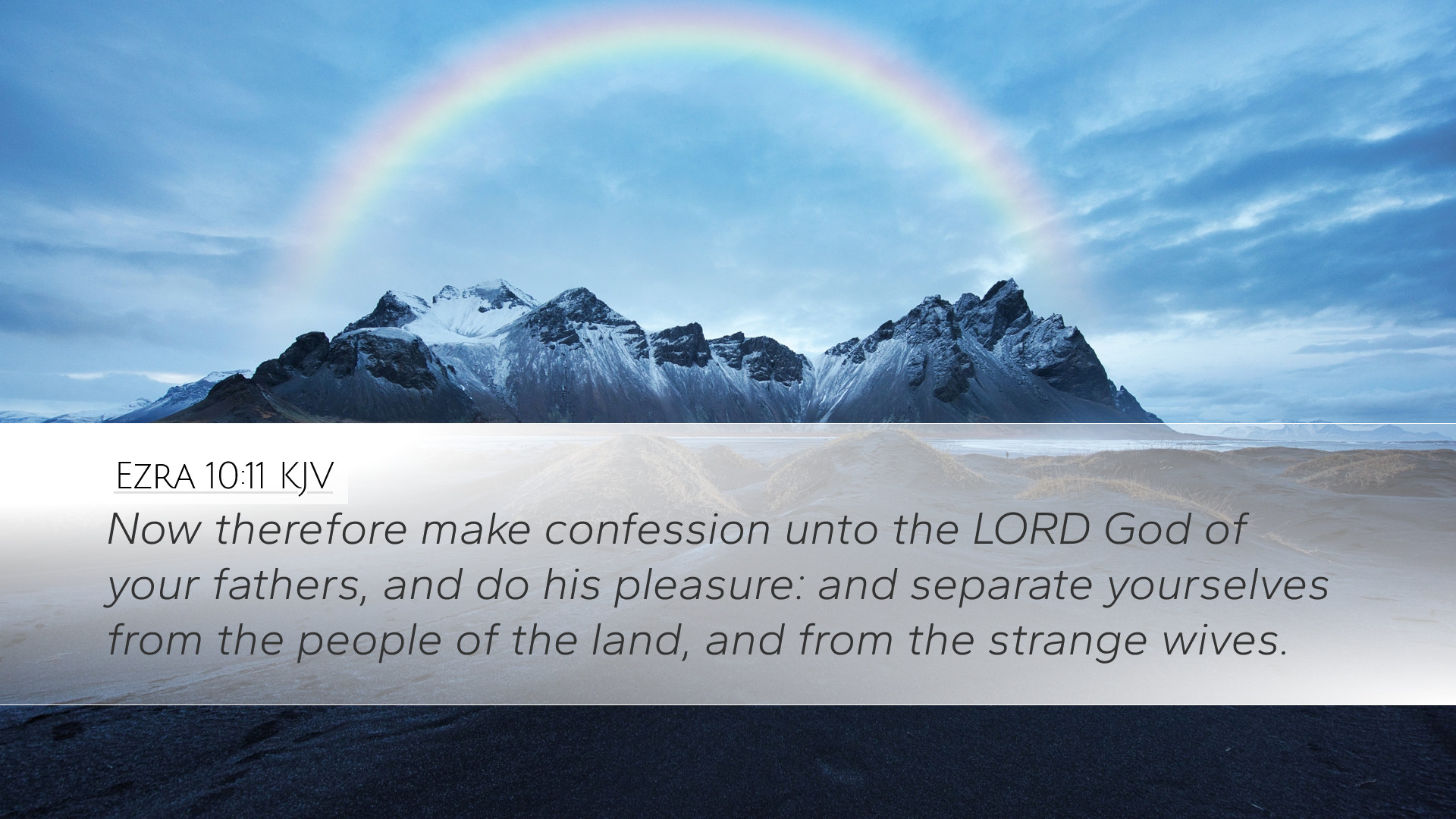Commentary on Ezra 10:11
Verse Text: "Now therefore make confession to the LORD God of your fathers, and do his pleasure: and separate yourselves from the people of the land, and from the strange wives."
Introduction
The book of Ezra chronicles the return of the Jewish exiles to their homeland after the Babylonian captivity. The tenth chapter addresses a critical moment in Israel’s history, as the returned exiles confront the issue of intermarriage with foreign nations, which poses a significant threat to their spiritual purity and covenant relationship with God. This verse serves as a call to repentance and reformation, emphasizing the need for the community to realign with God's commandments.
Contextual Analysis
Ezra’s leadership emerges during a time of moral and spiritual crisis. The returning exiles, who have endured 70 years of exile, find themselves in a precarious situation. Upon their return, they have mingled with the peoples around them, which includes intermarrying with foreign women, leading to a dilution of their identity and faith.
Exegesis of Key Phrases
- Make confession to the LORD God: This phrase indicates a recognition of sin and a humble approach toward God, demonstrating the necessity of repentance.
- Do his pleasure: This reflects the call to obedience, aligning one's actions with the will of God as revealed in the Torah.
- Separate yourselves from the people of the land: The command for separation underscores the importance of maintaining holiness and faithfulness to God's covenant, drawing from Levitical principles.
- From the strange wives: The reference to "strange wives" speaks not only to foreign nationality but also to the faith practices that could compromise Israel's devotion to Yahweh.
Theological Implications
This verse encapsulates several vital theological principles:
- Repentance: Acknowledging sin is the first step towards restoration; it involves both confession and a desire to turn away from sinful practices.
- Holiness: The call for separation encourages believers to live a consecrated life, as they reflect on how external influences can lead to spiritual compromise.
- Covenantal Fidelity: The exhortation to adhere to God's will reinforces the concept of divine covenant, illustrating the responsibilities of the people to maintain their unique identity as God's chosen.
Insights from Public Domain Commentaries
Matthew Henry
Matthew Henry offers a pastoral approach, noting that true repentance must be followed by action. He emphasizes the necessity of confessing one’s sins and aligning one's life to fulfill God’s commands. In his commentary, Henry points out that merely acknowledging sin is insufficient; the sinner must also separate from practices and associations that lead to temptation and compromise. He reflects on the profound implications of obedience as an outpouring of genuine confession.
Albert Barnes
Barnes highlights the communal aspect of the directive given in this verse. He states that the call to separation is not merely an individual endeavor but a collective response of the community. This communal aspect resonates deeply within the Church, where the purity of the body is essential for fulfilling its mission. Barnes emphasizes that spiritual leaders must guide their congregations in recognizing and rectifying areas of spiritual compromise, effectively reinforcing the call to an undivided heart in service to God.
Adam Clarke
Clarke resonates with the need for a firm stance against intermarriage, particularly in the context of idolatrous worship that often accompanied the traditions of foreign peoples. He addresses the historical context by explaining the dangers presented by these alliances, which could lead Israel away from exclusive worship of Yahweh. Clarke’s emphasis on the historical stance of Israel against foreign influences provides a rich resource for understanding contemporary applications of remaining distinct from societal pressures contradicting biblical teachings.
Application for Contemporary Believers
The truths contained within Ezra 10:11 are applicable to believers today in various ways:
- Self-examination: Pastors and students can draw from this text to encourage self-examination among their congregants, emphasizing the necessity of recognizing and confessing life choices that stray from God’s commandments.
- Community Accountability: This passage can foster discussions on the importance of community accountability in spiritual life, seeking collective holiness as a body of believers.
- Encouragement to Resist Cultural Pressures: The exhortation to "separate" remains relevant as Christians navigate modern life, where societal norms often conflict with biblical principles.
Conclusion
Ezra 10:11 serves as a powerful reminder of the profound need for repentance, obedience, and separation from influences that compromise spiritual integrity. The reflections from Matthew Henry, Albert Barnes, and Adam Clarke provide valuable insights for pastors, students, and scholars alike, illuminating the complexities of faithfulness to God amidst a challenging cultural landscape. As believers reflect on these themes, they are called to pursue a life that exemplifies devotion to God, embodying the righteousness He requires among His people.


